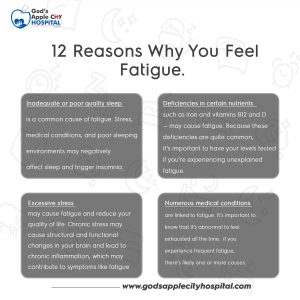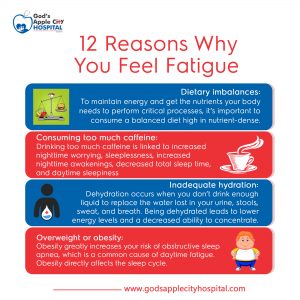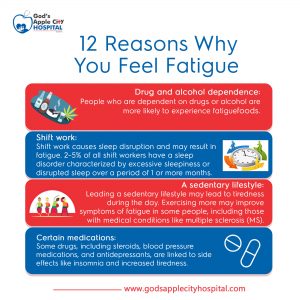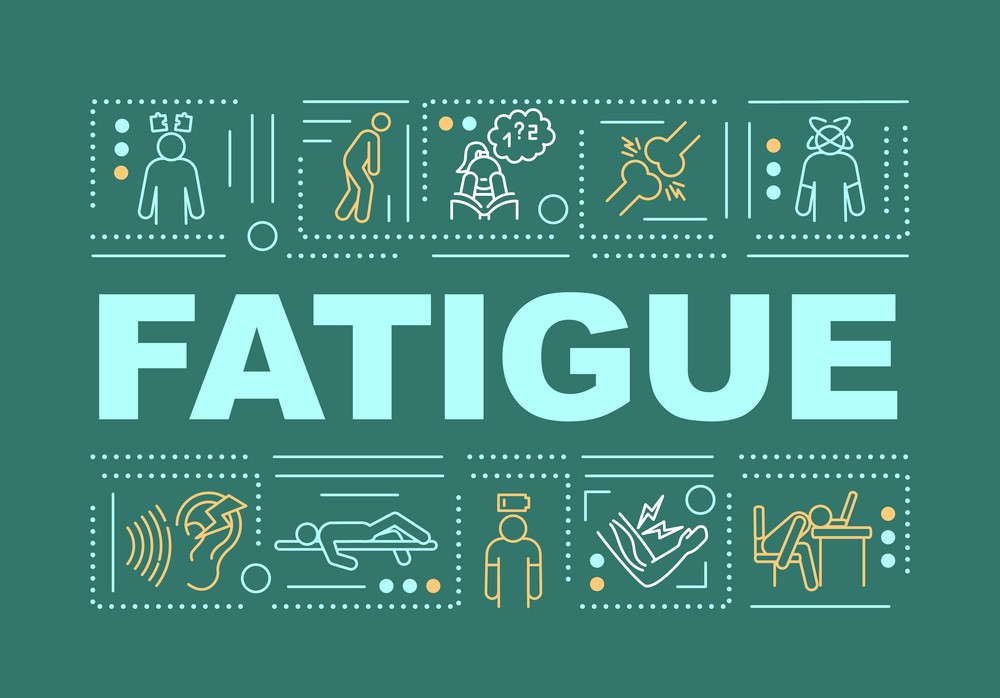Fatigue may be caused by simple factors like a lack of sleep or coming down with a cold or the flu. However, it can also be caused by underlying health conditions.
Even though everyone feels tired from time to time, chronic fatigue can harm your quality of life and prevent you from doing things you enjoy.
In most cases, fatigue can be remedied by lifestyle or dietary modifications, correcting a nutrient deficiency, or treating an underlying medical condition. Still, to improve fatigue, you need to get to the bottom of what’s causing it.
Here are 12 potential reasons why you’re always tired.
1. Not getting enough high quality sleep
Getting enough sleep is essential for overall health. Unfortunately, many of us don’t get enough, which may lead to fatigue.
During sleep, your body performs a number of critical processes, including releasing important growth hormones and repairing and regenerating cells. This is why most people wake up feeling refreshed, alert, and energized after a night of high quality sleep.
Importantly, sleep should be restful and uninterrupted to allow your brain to go through three stages of non-rapid eye movement (NREM) sleep and one stage of rapid eye movement (REM) sleep — the stage in which you dream.
Adults get at least 7 hours of sleep per night for optimal health.
Even though you may know the importance of getting enough sleep, falling and staying asleep can be a struggle.
Insomnia is a term for any condition that causes difficulty falling or staying asleep. It can be caused by several factors, including menopause, medical conditions, psychological stress, poor sleeping environments, and excessive mental stimulation.
Short-term insomnia, which lasts less than 3 months, is more common and affects 9.5% of the U.S. population. Yet, 1 in 5 cases of short-term insomnia turns into chronic insomnia, which occurs 3 or more times per week and lasts longer than 3 months.
If you’re experiencing insomnia, treatments like natural supplements, medications, and the management of underlying medical conditions may help. Visit your doctor to get the appropriate care and treatment.
2. Nutrient deficiencies
Nutrient deficiencies may lead you to feel exhausted on a daily basis, even if you’re getting more than 7 hours of sleep.
Deficiencies in the following nutrients have been linked to fatigue:
- iron
- riboflavin (vitamin B2)
- niacin (vitamin B3)
- pantothenic acid (vitamin B5)
- pyridoxine (vitamin B6)
- folate (vitamin B9)
- vitamin B12
- vitamin D
- vitamin C
- magnesium
Deficiencies in many of these nutrients are quite common.
Anemia affects 25% of the world’s population. Iron deficiency anemia is the most common type, responsible for 50% of all anemia. Fatigue is one of the most common symptoms of this condition, but it typically improves once iron stores are restored.
Additionally, a vitamin D deficiency may cause fatigue. Over half of the world’s population has inadequate vitamin D levels.
Because these deficiencies are quite common, it’s important to have your levels tested if you’re experiencing unexplained fatigue.
Typically, fatigue related to a deficiency in one or more nutrients improves once your nutrient levels normalize.

3. Stress
Although some stress is normal, chronic stress is linked to fatigue.
In fact, chronic stress may lead to stress-related exhaustion disorder (ED), a medical condition characterized by psychological and physical symptoms of exhaustion.
Furthermore, chronic stress may cause structural and functional changes in your brain and lead to chronic inflammation, which may contribute to symptoms like fatigue.
While you may be unable to avoid stressful situations, especially those related to work or family obligations, managing your stress may help prevent complete exhaustion.
For example, you can set aside time to decompress by taking a bath, meditating, or going for a walk.
A therapist may also help you develop strategies to reduce stress. Many health insurance plans cover mental health counseling, and virtual therapy is also an option.
4. Certain medical conditions
If you’re experiencing unexplained, chronic fatigue, you should visit your doctor and discuss your symptoms.
They may recommend testing to rule out certain health conditions that cause fatigue, such as sleep apnea, hypothyroidism, cancer, chronic fatigue syndrome, multiple sclerosis, anxiety disorders, kidney disease, depression, diabetes, and fibromyalgia.
It’s important to know that it’s abnormal to feel exhausted all the time. If you experience frequent fatigue, there’s likely one or more causes.
Getting proper treatment for an underlying medical condition can help you feel better and improve other areas of health as well.
5. Dietary imbalances
Your diet significantly affects the way you feel.
To maintain energy and get the nutrients your body needs to perform critical processes, it’s important to consume a balanced diet high in nutrient-dense foods.
Undereating or eating ultra-processed foods low in essential nutrients may lead to calorie and nutrient deficiencies, which can cause exhaustion.
When you don’t obtain enough calories and nutrients like protein, your body starts breaking down fat and muscle to meet energy demands. This leads to a loss of body fat and muscle mass, which may trigger fatigue.
Older adults are especially at risk of malnutrition and nutrient deficiencies due to factors like age-related changes in appetite and reductions in physical activity.
Additionally, diets high in ultra-processed foods impair energy levels. For example, a diet high in added sugar may harm sleep and lead to chronically high blood sugar and insulin levels, which can result in fatigue.
In a 28-day study in 82 people, a diet high in refined sugars and highly processed grains resulted in 38% and 26% higher scores for depressive symptoms and fatigue, respectively, than a low glycemic load diet high in whole grains and legumes but low in added sugar.
What’s more, a review including over 53,000 postmenopausal women associated diets high in added sugars and refined grains with a greater risk of insomnia and diets high in fruits, vegetables, and whole grains with a lower risk of insomnia.
Following a diet low in ultra-processed food and added sugar but rich in nutrient-dense foods like fruits, veggies, legumes, and protein sources like fish and eggs may help reduce fatigue and support healthy sleep while providing your body with optimal nutrition.
6. Consuming too much caffeine
Although caffeinated beverages like coffee and energy drinks give you a temporary boost of energy, over-reliance on them may make you more tired the next day. That’s because too much caffeine can harm sleep, which may cause fatigue.
Research shows that feeling tired in the morning leads people to consume large amounts of caffeine, which impairs your sleep cycle. In turn, you may overuse coffee or other caffeinated drinks for energy, which continues the cycle of poor sleep followed by too much caffeine.
Drinking too much caffeine is linked to increased nighttime worrying, sleeplessness, increased nighttime awakenings, decreased total sleep time, and daytime sleepiness.
A study in 462 women linked high calorie coffee and energy drink intake to poor sleep quality and sleep disturbance. Those who didn’t drink these beverages reported better sleep quality.
Still, caffeine tolerance varies, and some people are more sensitive to caffeine’s effects on sleep than others.
While coffee and caffeinated beverages like green tea may benefit health when consumed in moderation, energy drinks are extremely high in stimulants and added sugar. Thus, you should avoid them whenever possible.
If you’re currently experiencing sleep issues and frequently drink caffeinated beverages, try cutting back to see whether it helps improve your sleep and energy levels.

7. Inadequate hydration
Staying well hydrated is important for maintaining energy levels. The many biochemical reactions that take place in your body every day result in a loss of water that needs to be replaced.
Dehydration occurs when you don’t drink enough liquid to replace the water lost in your urine, stools, sweat, and breath. Several studies show that being dehydrated leads to lower energy levels and a decreased ability to concentrate.
In fact, dehydration affects your entire body, including your sleep cycles.
Being dehydrated may also make you feel more fatigued during exercise and negatively affect exercise endurance.
Although you may have heard that you should drink eight, 8-ounce (240-mL) glasses of water daily, hydration needs depend on several factors, including your weight, age, sex, and activity levels.
The key is drinking enough to maintain good hydration. Common symptoms of dehydration include thirst, fatigue, dizziness, and headaches. Even mild dehydration may reduce energy levels and alertness.
Make sure to drink enough to replace fluids lost during the day.
8. Overweight or obesity
Maintaining a healthy body weight is essential to overall health.
Not only is obesity significantly linked to a greater risk of many chronic illnesses like type 2 diabetes, heart disease, and certain cancers, but it may also increase your risk of chronic fatigue.
Obesity greatly increases your risk of obstructive sleep apnea, which is a common cause of daytime fatigue. It’s also linked to increased daytime sleepiness regardless of sleep apnea, suggesting that obesity directly affects the sleep cycle.
What’s more, people with obesity have a higher risk of conditions associated with fatigue, including depression and type 2 diabetes.
Plus, poor sleep quality and sleep restriction may cause weight gain or obesity.
Maintaining a healthy body weight may support good sleep and energy levels, while getting high quality sleep may help prevent weight gain and reduce fatigue.

9–12. Other causes of fatigue
Many other conditions may lead to tiredness. It’s important to understand that several factors may be contributing to your exhaustion.
Here are a few other common reasons why you may feel tired:
- Drug and alcohol dependence. Research shows that people who are dependent on drugs or alcohol are more likely to experience fatigue.
- Shift work. Shift work causes sleep disruption and may result in fatigue. Sleep experts estimate that 2–5% of all shift workers have a sleep disorder characterized by excessive sleepiness or disrupted sleep over a period of 1 or more months.
- A sedentary lifestyle. Leading a sedentary lifestyle may lead to tiredness during the day. Studies show that exercising more may improve symptoms of fatigue in some people, including those with medical conditions like multiple sclerosis (MS)..
- Certain medications. Some drugs, including steroids, blood pressure medications, and antidepressants, are linked to side effects like insomnia and increased tiredness.
It may be difficult or impossible to identify the factor(s) behind your fatigue on your own, which is why it’s important to work with a doctor you trust. They can help you find the cause and suggest possible treatments.
Kindly Check us out on Facebook @ godsapple.hospital
Click on the link below to read other posts:

